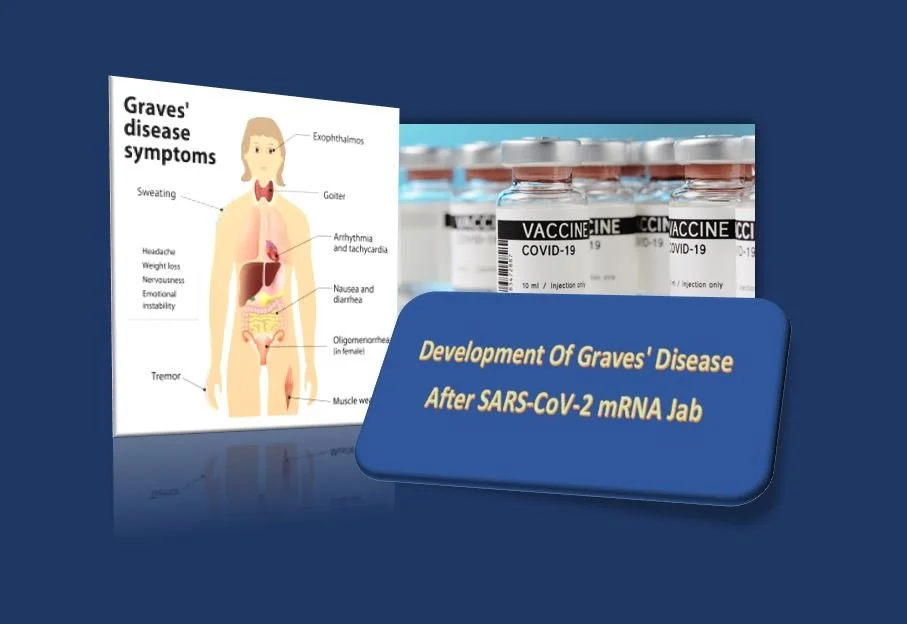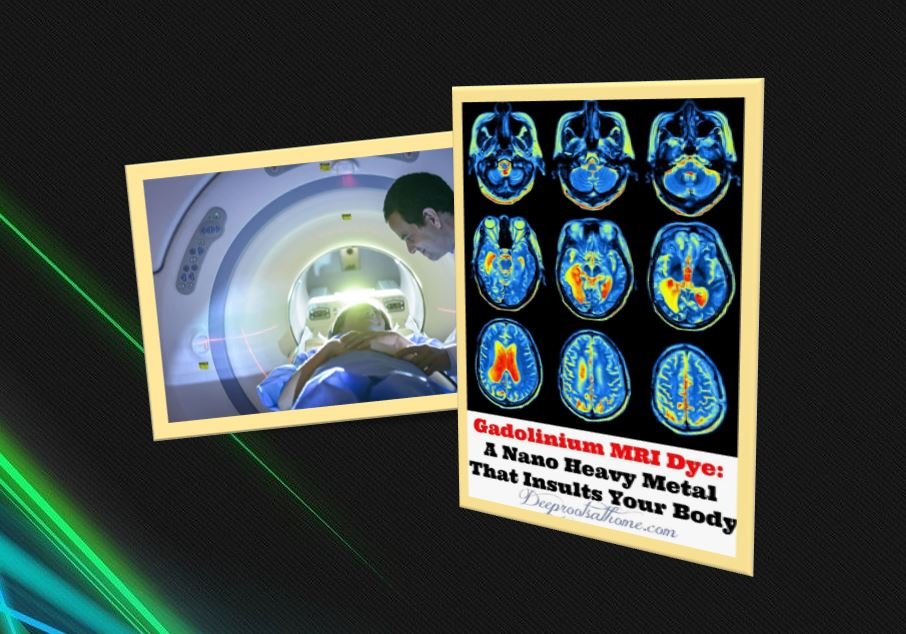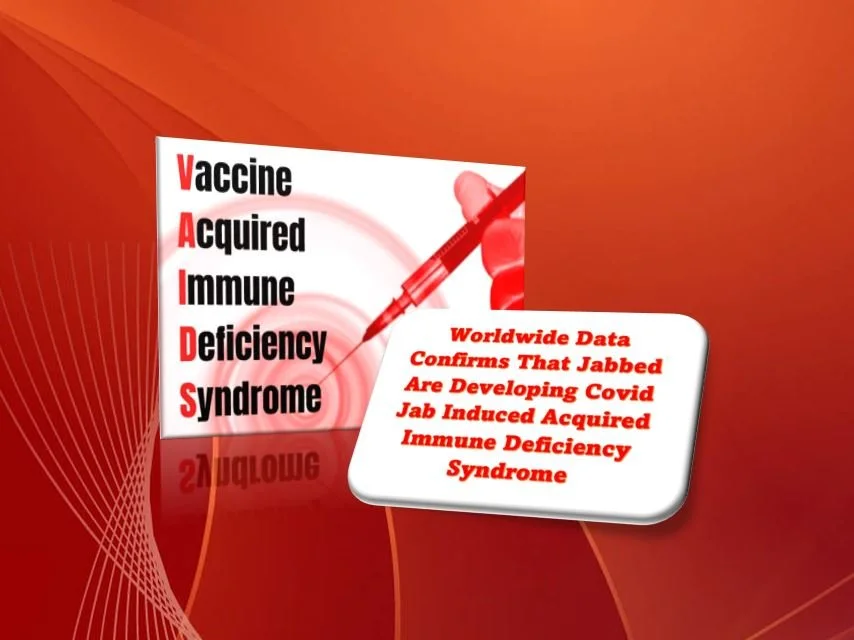Documented Case Of Graves Disease Linked With COVID-19 Jab
A cases reported and literature review found medically confirmed cases of Graves disease following after COVID-19 jab, according to a reports published in medical journals :
Recurrence of Graves’ Disease (a Th1-type Cytokine Disease) Following SARS-CoV-2 mRNA Vaccine Administration: A Simple Coincidence?
Guillaume Pierman, Etienne Delgrange, Corinne Jonas
Department of Endocrinology, Centre Hospitalier Universitaire de Mont-Godinne, Yvoir, Belgium
Doi: 10.12890/2021_002807 - European Journal of Case Reports in Internal Medicine - © EFIM 2021
Received: 29/07/2021
Accepted: 01/08/2021
Published: 02/09/2021
How to cite this article: Pierman G, Delgrange E, Jonas C. Recurrence of Graves' disease (a Th1-type cytokine disease) following SARS-CoV-2 mRNA Vaccine administration: a simple coincidence? EJCRIM 2021;8 doi:10.12890/2021_002807.
Conflicts of Interests: The authors declare there are no competing interests.
This article is licensed under a Commons Attribution Non-Commercial 4.0 LicenseABSTRACT
Graves’ disease is the most frequent cause of hyperthyroidism in young women. This auto-immune disease is due to the production of class 1 IgG stimulating the TSH receptor. These antibodies are produced secondary to a Th1 immune response in which interferon gamma plays a key role. Vaccination is ongoing worldwide against SARS-CoV-2 and some of the vaccines include mRNA which seems to stimulate the Th1 immune response. Here, we report a case of recurrence of hyperthyroidism due to Graves’ disease following mRNA vaccination and discuss the possible implicated mechanism. This observation argues for a systematic study of a population of patients with previous Graves’ disease in order to assess the risk of recurrence following vaccination.
LEARNING POINTS
Grave’s disease is a Th1-mediated immune disease in which interferon gamma plays a key role.
The recurrence of hyperthyroidism due to Grave’s disease should be monitored in patients exposed to risk factors.
INTRODUCTION
Vaccination is ongoing worldwide against SARS-CoV-2 and for the first time, some of the vaccines include mRNA. Recently, several cases of myocarditis were reported after mRNA vaccination, which should prompt us to watch out for other potential immune side effects of these new generation vaccines.
CONCLUSION
We report a case of recurrence of hyperthyroidism due to Graves’ disease following administration of an mRNA COVID-19 vaccine. It is not possible to establish a link between the two events and the benefits of COVID-19 vaccination are obviously not in question. Vaccination must be the priority in the fight against COVID-19. A systematic study of a population of patients with previous Graves’ disease would be necessary in order to assess the risk of recurrence following vaccination. If a link was shown, it would allow us to better understand the pathophysiology of Graves’ disease.
https://www.ejcrim.com/index.php/EJCRIM/article/view/2807/2819
Potential relationships between COVID-19 and the thyroid gland: an update
First Published February 28, 2022 Review Articlehttps://doi.org/10.1177/03000605221082898Article information
Abstract
In this review, I aim to provide a complete overview of recent advances in knowledge regarding severe acute respiratory syndrome-coronavirus 2 (SARS-CoV-2)-induced thyroid dysfunction. I discuss the findings regarding the role of SARS-CoV-2 in the development of thyroid dysfunction, including subacute thyroiditis, Graves’ disease, non-thyroidal illness, thyrotoxicosis and Hashimoto’s thyroiditis during and subsequent to coronavirus disease 2019 (COVID-19). The thyroid gland and the entire hypothalamic–pituitary–thyroid (HPT) axis may represent key targets of SARS-CoV-2. Thyroid dysfunction during and subsequent to COVID-19 has been documented in clinical studies and is usually reversible. Most of the thyroid disorders, including Graves’ disease, euthyroid sick syndrome, Hashimoto’s thyroiditis and subacute thyroiditis, have been documented as sequelae to COVID-19, and the SARS-CoV-2 virus has been implicated in the aetiology of each. COVID-19 has been suggested to trigger the activation of pre-existing thyroid disease or autoimmunity. Furthermore, patients with uncontrolled thyrotoxicosis are at risk of SARS-CoV-2 infection-related consequences. Because of the neutropenia caused by antithyroid medications, which may obscure the signs of COVID-19, this group of patients should receive special attention. It is suggested that thyroid dysfunction during COVID-19 is caused by direct infection of the thyroid or “cytokine storm”-mediated autoimmune effects on the thyroid.
https://journals.sagepub.com/doi/full/10.1177/03000605221082898
SARS-CoV-2 mRNA Vaccination and Graves’ Disease: A Report of 12 Cases and Review of the Literature
Ying Jie Chee, Huiling Liew, Wai Han Hoi, Yingshan Lee, Brenda Lim, Han Xin Chin, Ray Tian Rui Lai, Yunqing Koh, Michelle Tham, Cherng Jye Seow ... Show more
The Journal of Clinical Endocrinology & Metabolism, dgac119, https://doi.org/10.1210/clinem/dgac119
Published:
02 March 2022
Abstract
Context and objective
Thyroid autoimmunity has been reported to be associated with severe acute respiratory syndrome coronavirus 2 (SARS-CoV-2) and the SARS-CoV-2 vaccination recently. We report a series of patients who presented with new onset or relapse of Graves’ disease-related hyperthyroidism shortly after receiving the SARS-CoV-2 messenger RNA (mRNA) vaccine at a single tertiary institution in Singapore.
Conclusion
Our case series provides insight into the characteristics of individuals in whom Graves’ disease was triggered by the SARS-CoV-2 vaccination. Clinicians need to be vigilant of precipitation or exacerbation of autoimmune thyroid disorders in predisposed individuals after exposure to the SARS-CoV-2 vaccination. Further epidemiological and mechanistic studies are required to elucidate the possible associations between the SARS-CoV-2 vaccines and the development of thyroid autoimmunity.
https://academic.oup.com/jcem/advance-article/doi/10.1210/clinem/dgac119/6541252
Graves' Disease Following COVID-19 VaccinationPublished: April 23, 2022 (see history)
DOI: 10.7759/cureus.24418
Cite this article as: Singh G, Howland T (April 23, 2022) Graves' Disease Following COVID-19 Vaccination. Cureus 14(4): e24418. doi:10.7759/cureus.24418
Abstract
Autoimmune endocrine diseases have been reported after influenza and the human papillomavirus vaccine, but there is limited data on autoimmune diseases after coronavirus disease 2019 (COVID-19) vaccination. Our report is about a 42-year-old Caucasian male and a 68-year-old Caucasian female who developed Graves’ disease after receiving Moderna (Moderna, Inc., Cambridge, Massachusetts, United States) and Johnson & Johnson (Johnson & Johnson, New Brunswick, New Jersey, United States) vaccines, respectively. Both patients had no previous autoimmune thyroiditis and had normal thyroid function but developed hyperthyroidism characterized by suppressed thyroid-stimulating hormone (TSH), elevated free T4 level, and TSH receptor antibodies after vaccination.
COVID-19 vaccines, either mRNA-based (Moderna) or non-mRNA-based (Johnson & Johnson), can cause Graves’ disease. The clinical manifestations are similar to Graves’ disease but without ocular manifestations.
https://www.cureus.com/articles/90877-graves-disease-following-covid-19-vaccination
CASE REPORT article
Front. Public Health, 23 November 2021 | https://doi.org/10.3389/fpubh.2021.778964
Development of Graves' Disease After SARS-CoV-2 mRNA Vaccination: A Case Report and Literature Review
David Tak Wai Lui, Ka Kui Lee, Chi Ho Lee, Alan Chun Hong Lee, Ivan Fan Ngai Hung and Kathryn Choon Beng Tan*
Department of Medicine, The University of Hong Kong, Queen Mary Hospital, Hong Kong, Hong Kong SAR, China
Background: Mounting evidence has revealed the interrelationship between thyroid and severe acute respiratory syndrome coronavirus 2 (SARS-CoV-2) to explain the thyroid dysfunction and autoimmune thyroid disorders observed after coronavirus disease 2019 (COVID-19). There are limited reports of thyroid dysfunction after SARS-CoV-2 vaccination.
Methods: We report a case of a 40-year-old Chinese woman who developed Graves' disease after BNT162b2 mRNA vaccine. A search of PubMed and Embase databases from 1 September 2019 to 31 August 2021 was performed using the following keywords: “COVID,” “vaccine,” “thyroid,” “thyroiditis,” and “Graves.”
Results: A 40-year-old Chinese woman who had 8-year history of hypothyroidism requiring thyroxine replacement. Her anti-thyroid peroxidase and anti-thyroglobulin antibodies were negative at diagnosis. She received her first and second doses of BNT162b2 mRNA vaccine on 6 April and 1 May 2021, respectively. She developed thyrotoxicosis and was diagnosed to have Graves' disease 5 weeks after the second dose of vaccine, with positive thyroid stimulating immunoglobulin level, diffuse goiter with hypervascularity on thyroid ultrasonography and diffusely increased thyroid uptake on technetium thyroid scan. Both anti-thyroid peroxidase and anti-thyroglobulin antibodies became positive. She was treated with carbimazole. Literature search revealed four cases of Graves' disease after SARS-CoV-2 vaccination, all after mRNA vaccines; and nine cases of subacute thyroiditis, after different types of SARS-CoV-2 vaccines.
Conclusion: Our case represents the fifth in the literature of Graves' disease after SARS-CoV-2 vaccination, with an unusual presentation on a longstanding history of hypothyroidism. Clinicians should remain vigilant about potential thyroid dysfunction after SARS-CoV-2 vaccination in the current pandemic.
https://www.frontiersin.org/articles/10.3389/fpubh.2021.778964/full
CASE REPORTYear : 2022 | Volume : 12 | Issue : 1 | Page : 93-96Thyroid eye disease reactivation associated with COVID-19 vaccination
Kathryn S Park1, Sammie E Fung1, Michelle Ting2, Daniel J Ozzello2, Jin Sook Yoon2, Catherine Y Liu2, Bobby S Korn3, Don O Kikkawa3
1 Shiley Eye Institute, University of California San Diego, La Jolla, CA, USA
2 Shiley Eye Institute, University of California San Diego; Division of Oculofacial Plastic and Reconstructive Surgery, UC San Diego Viterbi Family Department of Ophthalmology, La Jolla, CA, USA
3 Shiley Eye Institute, University of California San Diego; Division of Oculofacial Plastic and Reconstructive Surgery, UC San Diego Viterbi Family Department of Ophthalmology; Division of Plastic and Reconstructive Surgery, UC San Diego Department of Surgery, La Jolla, CA, USADate of Submission16-Dec-2021Date of Acceptance24-Dec-2021Date of Web Publication28-Feb-2022
Correspondence Address:
Dr. Don O Kikkawa
Shiley Eye Institute, University of California San Diego, La Jolla, CA; Division of Oculofacial Plastic and Reconstructive Surgery, UC San Diego Viterbi Family Department of Ophthalmology, La Jolla, CA
USASource of Support: None, Conflict of Interest: None
DOI: 10.4103/tjo.tjo_61_21
Abstract
To describe the presentation of both new-onset and reactivation of thyroid eye disease (TED) following COVID-19 vaccination. Single-institution retrospective case series of patients presenting with symptoms and signs of new or reactivated TED coinciding with recent COVID-19 vaccination. Data collected included patient age, gender, presenting symptoms, ocular history, clinical signs, and interval duration between vaccination and onset of ocular symptoms. Three female patients were identified. All patients were over 18 years of age (range 45–66 years). Patients received either the Moderna or Pfizer COVID-19 vaccine and presented with symptoms of TED within 24 h to 21 days of receiving their first or second dose. None of the patients had previous infections with severe acute respiratory syndrome coronavirus 2. Two patients had a history of inactive TED with stable thyroid function tests: One of these patients had stable disease for at least 15 years and the other had stable disease for 5 years. The third patient had no previous history of thyroid dysfunction or TED and presented with low levels of thyroid-stimulating hormone. All three cases presented with proptosis. In two of three cases, periorbital edema, eyelid retraction, and diplopia were present. None were current smokers. One had prior facial hyaluronic acid filler injections. Symptoms in all cases were improving at 4 to 8 months. While the possibility of unrelated TED flaring concurrently with COVID-19 vaccination exists, questions remain on the effects of the COVID-19 vaccine in patients with autoimmune ophthalmic diseases. Physicians should be aware of this potential association and counsel patients appropriately.
Worsening of Graves' ophthalmopathy after SARS-CoV-2 mRNA vaccination
Armando Patrizio 1, Silvia Martina Ferrari 2, Alessandro Antonelli 3, Poupak Fallahi 4
Affiliations expand
PMID: 35413468
PMCID: PMC8994413
Abstract
More reports are documenting how vaccines against severe acute respiratory syndrome coronavirus 2 (SARS-CoV-2) could represent new external triggers for autoimmune endocrine diseases (AIED) in patients with individual predisposition. We report two cases of Graves' Ophthalmopathy (GO) recrudescence few days after the administration of BNT162B2 (Pfizer-BioNTech) SARS-CoV-2 vaccine. Even if causality relationship cannot be excluded, the development of these events could be explained through immune mediated mechanism such as the autoimmune/inflammatory syndrome induced by adjuvants (ASIA). While further investigations are necessary to improve our knowledge of the underlying pathogenesis of these phenomena, caution may be warranted when vaccinating individuals with known autoimmune diseases.
Keywords: COVID-19; Graves' disease; Graves' ophthalmopathy; SARS-CoV-2; Vaccine.
Copyright © 2022. Published by Elsevier B.V.
Case report
Graves’ disease following administration of second dose of SARS-CoV-2 vaccine
Correspondence to Timothy James Goblirsch; tjg58@georgetown.edu
Abstract
The SARS-CoV-2 vaccines have had an overwhelming success in curbing the COVID-19 global pandemic, accounting for countless lives saved. Adverse reactions are inevitable, given the vast scale of vaccination required to mitigate future surges of COVID-19. Hyperthyroid disorders have been reported as potential adverse reactions to SARS-CoV-2 vaccines in two patients with Graves’ disease and a group of adults with subacute thyroiditis occurring in young women healthcare workers. We report a case of clinical Graves’ disease in a woman with a previously stable multinodular goitre that occurred 14 days following her second dose of Pfizer-BioNTech SARS-CoV-2 vaccine.
This article is made freely available for use in accordance with BMJ’s website terms and conditions for the duration of the covid-19 pandemic or until otherwise determined by BMJ. You may use, download and print the article for any lawful, non-commercial purpose (including text and data mining) provided that all copyright notices and trade marks are retained.
https://bmj.com/coronavirus/usage







